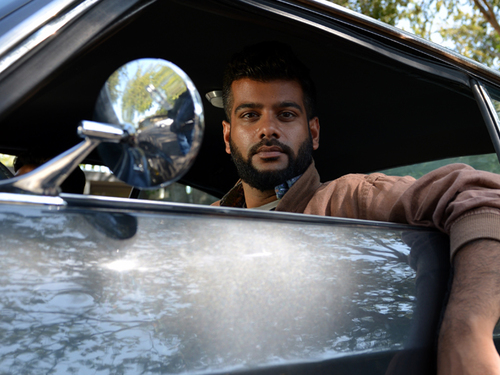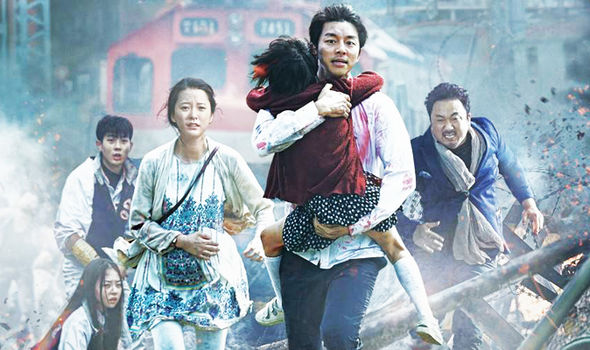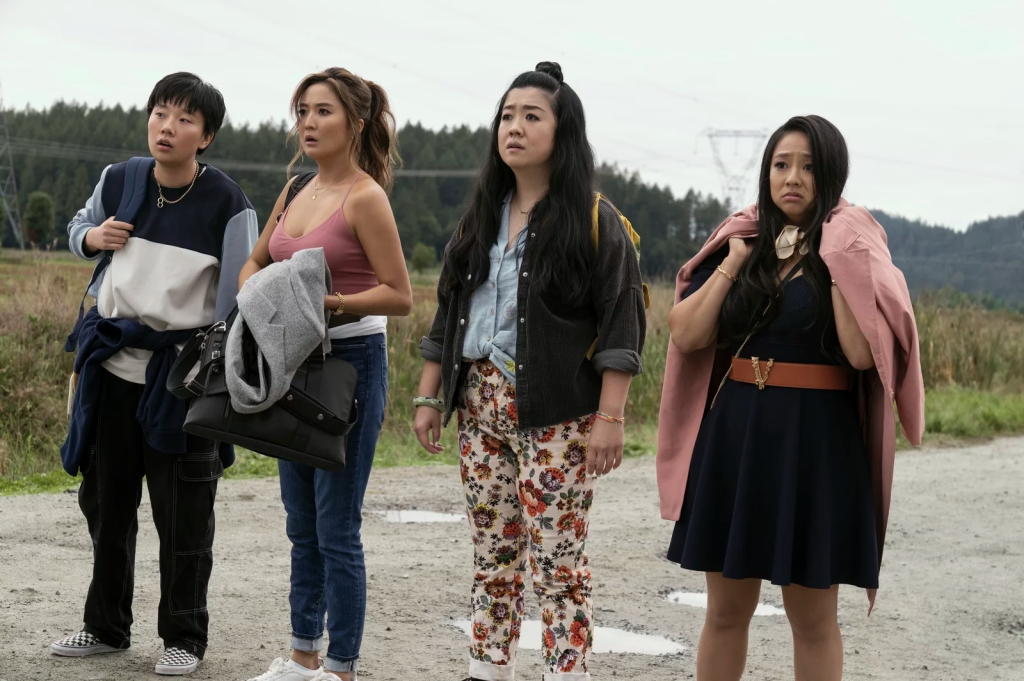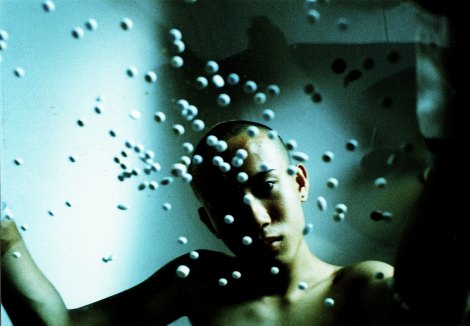Posts tagged ‘caamfest’
A More Constructive Use of Leisure Time: CAAMfest 2023 review
I had an interesting conversion recently with a friend who’s worked in the independent Asian American film community for a long time. He postulated that in some ways, Asian American film festivals have achieved everything they set out to do when they first started up back in the 1970s, which to him meant increasing the visibility and voices of Asian Americans in the US filmmaking landscape. In some ways I think he’s on target, with Everything Everywhere All At Once winning the Best Picture Oscar this year and streamers regularly programming Asian American content of all types. So where do we go from here? The 2023 CAAMfest shows all of the pros and cons of Asian American narrative plenitude.
CAAMfest opening night film, Joy Ride (dir. Adele Lim), is a great example of what happens when Asian American voices are mainstreamed—namely, that we’ve come far enough that we now have silly sex comedies from an Asian American perspective. I didn’t hate this movie and I did laugh in some parts but to my mind it was pretty predictable and pretty much lacking in emotional depth of any sort. The cast works hard and is charming and agreeable but all of their hard work can’t disguise the film’s sloppy story construction and gaping plot holes. Twenty years ago we all would’ve eaten this kind of movie up as progress but now that we’ve got a lot more options I feel less forgiving about this kind of simplistic execution. We don’t necessarily have to support representation for the sake of representation.
Similarly, Land of Gold (dir. Nardeep Khurmi), about a Sikh American long haul trucker who acquires a young Mexican American stowaway in his rig, is told in fairly conventional strokes. Currently airing on HBO Max, the film does feel like a made-for-TV movie in its standard narrative beats. Lead actor/director/writer Nardeep Khurmi is solid as the truck driver with some family issues to work out but I was very annoyed by child actor Caroline Valencia as the stowaway. She’s the kind of precocious and self-assured kid performer who feels like she’s been taking tap-dancing and voice lessons since she was wee and thus lacks any discernible authenticity as an actual child. But other reviewers have praised her performance and Land of Gold won both Best Narrative and the Audience Award at CAAMfest so what do I know? Again, twenty years ago this film would have been groundbreaking but now it seems less so to me. That said, I did love seeing the world of long-haul truckers and appreciated the small details, like the fact that every truck stop now serves Indian food and that there are homespun gurdwaras along the highway to allow the Sikh drivers to worship as needed.
More poetic and less formulaic is The Accidental Getaway Driver (dir. Sing J Lee), about an elderly Vietnamese driver for hire who gets caught up with three escaped convicts on the run in Southern California. The film does a good job connecting generational trauma with life on the lam, utilizing beautiful emotional dreamlike images and a gritty, dark mis en scene to create an unusual visual texture. Lead actor Hiệp Trần Nghĩa is great as Long, the driver who forms an unexpected bond with Tây (Dustin Nguyen), one of the convicts who is also Viet. Dustin Nguyen, who debuted as a teen star way back in the 1980s on 21 Jump Street, is excellent as the world-weary convict searching for a chosen family. He’s now sixty years old (!) and he’s come a long way from his heartthrob beginnings to become a sensitive and nuanced performer. Although at first it appears to be a crime film, with a noirish look and feel, the movie ultimately is about the relationships formed between the characters as they find solace and connections with each other.
Liquor Store Dreams is So Yun Um’s debut feature documentary and she guides the film with a sure hand. The doc is an expansion of her short film Liquor Store Babies (2014) and the longer version allows Um to elaborate on several of the themes she touched on in her short. Um updates the story of her Korean immigrant parent’s immigration experiences in the US to include pandemic era, expanding her scope to include a thread on reconciliations between black & Korean communities in Los Angeles. Her kind and smiley Dad is a healing presence throughout the film.
Another example of how Asian American voices have reached the mainstream, Jeanette Lee vs was produced by ESPN for their 30 for 30 series of profiles of sports figures. Director Ursula Liang brings a decidedly Asian American perspective to the story of Korean American Jeanette Lee, aka The Black Widow, who in the 1990s was one of the most famous and popular professional pool players in the world. Liang describes the many obstacles Lee faced to reach success in her sport including childhood scoliosis and a battle with cancer later in life, as well as the racism and misogyny she dealt with throughout her career. Liang also includes a moving interview with Lee’s elderly mother who describes her fear that her daughter will predecease her. By focusing not only on Lee’s professional journey but her struggles with white supremacy and patriarchy Liang injects a bit of Asian Americanism into a doc made for a general audience.
Twelve Days, Hong Kong director Aubrey Lam’s dramatic romance had no edge. The story, about a doormat wife and her asshole husband, is an AITA post come to life. It’s hard to feel much sympathy for either character since both the husband and wife are ciphers with no interior lives or motivations. With all of the interesting indie films coming out of Hong Kong these days it’s telling that this sleek, vacuous and politically inoffensive piece of aggravation is what the Hong Kong Film Council chose to showcase.
The uncatagorizable hybrid feature Starring Jerry As Himself (dir. Law Chen) was one of my favorite films from the festival but it’s impossible to explain this film’s appeal without spoiling it. Suffice to say I found it entirely satisfying and completely unpredictable, with dramatic music, solid performances, and good cinematography that makes good use of its Florida location, where nothing is as it seems and everything is fleeting and unreadable.
Wisdom Gone Wild, Rea Tajiri’s latest experimental documentary, is a lovely, thoughtful, and surprising portrait of Rea’s aging mom and her progression into dementia. The film shows dementia as a blessing that can become a new language and way of perceiving and combines a gorgeous sound design with home movies, contemporary footage, archival photos, a spare voiceover and Rea’s mom’s own gems of perception. I especially liked the evocative use of midcentury songs such as Smoke Gets In Your Eyes and other standards from the American songbook. The film is a brilliant example of how to say more with less and how to have faith in your viewers’ ability to discern meaning without excessive explanation. To my mind it is really the best thing in this year’s festival. Wisdom Gone Wild’s freeform, improvisational structure, guided expertly by Rea’s accomplished, confident hand, results in a film that’s not afraid to take risks and make bold and surprising choices.
Rea Tajiri’s documentary is the kind of film that I want to see from Asian American cinema in the 21st century, and not just horny road trip movies. I hope that we don’t simply aspire to insert Asian American characters into the same old genre movies. I want to be confounded and surprised by Asian American movies, not shown the same stories we’ve seen before. Otherwise we may find Asian American filmmaking to be obsolete and irrelevant, as it becomes just another cog in the commercial moviemaking machine.
If This Was A Movie: October Film Festival roundup
After all hell broke loose in the U.S. back in March one of the first film festival casualties of the COVID-19 crisis was South By Southwest (aka SXSW). Scheduled to open on March 16, it was impossible for the festival to pivot to online immediately and so the entire event was jettisoned. Other film festivals that had been scheduled in the chaotic couple months following were postponed or canceled outright, but those that were slotted a bit later in the year gradually began to pivot and now, as the pandemic enters its seventh month here in the U.S., most festivals are fully online. In addition, some of the previously postponed festivals are also launching programming, leading to an embarrassment of moviegoing riches. This month alone includes CAAMfest Forward, which just started on Oct. 14 and runs until Oct.18, the Mill Valley Film Festival, which is currently running until Oct. 18, and the 3rd I South Asian Film Festival, which runs Oct. 23-25.
CAAMfest Forward’s centerpiece presentation, Definition Please, directed by and starring Sujata Day (The Mis-Adventures of Awkward Black Girl; Insecure) is a charming and pleasant effort, with the film’s main strength being Sujata’s ability to keep the tone of the film light and consistent. The narrative swerves a bit, though, touching on mental illness, sibling relationships, and familial obligations, but it’s anchored by Sujata’s pitch-perfect, likeable performance. It’s also nice to see a film set outside of a major urban area that nonetheless has a majority Asian cast, which speaks to to the the changing demographics of the Asian American community.
Veteran director Wayne Wang (Chan Is Missing; The Joy Luck Club) has recently gone from directing Hollywood blockbusters to more intimate, personal film projects and with his most recent film, Coming Home Again, he’s hit his stride. Based on a New Yorker essay by Korean American writer Chang Rae-Lee, the film follows a Korean American man who returns to his childhood home to care for his cancer-stricken mother. With gorgeous cinematography by Richard Wong (Colma: The Musical) and a nicely calibrated performance by Justin Chon, the film has an understated emotionality that avoids veering into melodrama.
Takeout Girl (dir. Hisonni Johnson) is a bit like Starsky and Hutch episode updated to the 21st century but it’s engaging nonetheless. At first Hedy Wong, who also co-wrote the film, seems too pretty and has way too much eye makeup for the part she’s playing but as Tara, the titular takeout girl, she never wavers from her wary, streetwise persona. Ultimately the film is fun to watch in a cheesy, genre way, full of drug labs, junkies, and shiny, silver-plated pistolas. Although the motivation for the film’s climax is completely contrived, it allows the movie to end in a blaze of angsty glory.
CAAMfest Forward also includes the first several episodes of Natalie Tsui’s web series Chosen Fam, a fun and kicky look at a group of QTPOC hipsters in San Francisco. The show features engaging performances from its multi-culti cast and a smexy attitude that’s echoed by its bright, color-saturated art direction.
Bulge Bracket (dir. Christopher Au), another episodic drama in the festival, is full of finance-bro characters that slip into cliché, but Jessika Van as the new gal navigating the sharky waters of a high-powered investment bank and Feodor Chin as the company boss both turn in solid performances. It’s hard to care a lot about the motivations of the Wall Street characters, though, as they pretty much are greedy bastards who primarily live to make a lot of money.

CAAMfest Forward is also on trend as it includes two drive-in movie nights. The first, an Oct. 14 opening night program, included Lea Salonga In Concert with the Sydney Symphony Orchestra, a performance film starring the Filipino American Broadway diva, and 7,000 Miles: Homecoming, a documentary following Bay Area rapper Ruby Ibarra’s trip back to the Philippines for a short concert tour. The resurrection of the drive-in movie is one of the most pleasant unintended consequences of the COVID shelter-in-place era and this program, at the Fort Mason Flix Center, was a lot of fun. Fort Mason’s venue has been running for a few months now and the operation is smooth and easy to access, with clean indoor bathrooms, a small concessions stand (with popcorn!) and food trucks. And when my battery died from running the car radio during the double bill, Fort Mason staff immediately popped the hood on my vehicle and gave me a jump. The second drive-in movie night, on Oct. 15, will include screenings of two Hong Kong films directed by women, My Prince Edward (dir. Norris Wong Yee-Lam, 2019) and Ann Hui’s drama A Simple Life (2011), which cleaned up at both the Hong Kong Film Awards and the Golden Horse Awards when it was first released.
The Mill Valley Film Festival also has several drive-in movies on its schedule, next to the lagoon at the Marin Civic Center. The film that I saw, the Robert DeNiro/Tommy Lee Jones comedy, The Comeback Trail (2020, dir. George Gallo), was really dreadful, but the viewing experience itself was pleasant. MVFF had many helpful volunteers directing traffic (thought there was a bit of a traffic jam exiting after the screening) and their spotless portapotties are sanitized after every use. The next film I’m scheduled to see, the biodoc The Bee Gees: How Can You Mend A Broken Heart, will almost certainly be better than the DeNiro film.

Also of note from MVFF is Marcia Jarmel and Ken Schneider’s lovely documentary, Los Hermanos/The Brothers, which looks at Afro-Cubano sibling musicians Ilmar and Aldo López-Gavilán. Virtuoso violinist Ilmar immigrated from Cuba to the U.S. decades before, while his younger brother Aldo a gifted pianist, remained in Cuba. The film follows the brothers as they attempt to record an album together despite political and geographic challenges. Los Hermanos effortlessly weaves together its images with its gorgeous score (composed by Aldo), using the soundtrack to drive and elevate the narrative. One of my favorite bits in the film mirrors Aldo and Ilmar’s struggles to find each other at their respective airports in Cuba and New York City, a small and humorous element that exemplifies Jarmel and Schneider’s skillful portrayal of the brothers’ relationship with each other. The movie also turns an affectionate lens on Cuba, depicting the island nation awash in vibrant pastel light.

Also upcoming on the Bay Area film cinemagoing docket is the 3rd I South Asian Film Festival. Free and fully online this year, the festival includes a tribute to the legendary actor Irffan Khan (The Lunchbox; Life of Pi) who recently passed away from cancer.
Keep Your Head To The Sky: 2017 CAAMfest

Angsty emo, The Lockpicker, 2016
CAAMfest is just around the corner so I’m posting a few quick recos to help people wade through the massive program. As usual this year the festival is screening more than 100 films, plus music and food events, so finding your bliss can be a daunting process. Here are a few things that I’ve seen that I like. Get your tickets while they’re hot—they’re going fast!

Wood paneling and wide ties, The Tiger Hunter, 2016
The Tiger Hunter, dir. Lena Khan
A sweet and amusing comedy set in the 1970s about an Indian guy who moves to the US to make his fortune, The Tiger Hunter is a crowd-pleaser that’s set as the CAAMfest opening night movie. Danny Pudi is appealing and genial as the son of the titular tiger hunter and the ensemble cast brings a goofy charm to the rest of the film. Speaking as someone who grew up in that inglorious decade I can also say that the 70s art direction is totally on point.
The Lockpicker, dir. Randall Okita
Randall Okita’s teen angst drama made my best-of list for 2016 and I’m sticking by that decision. Asian American narrative film directors have pretty much mastered the art of mimicking Hollywood movies these days, but The Lockpicker is a different animal altogether. Raw, unstructured, and brutally honest in its examination of some of the worst aspects of adolescence, the film is anchored by a charismatic and emo performance by first-time actor Keigian Umi Tang. As I’ve said before, as a parent of teenagers this movie terrified me in its depiction of the casual cruelty of ennui-stricken youth.

Sunkrish looking fly, Chee and T, 2016
Chee and T, dir. Tanuj Chopra
Tanuj Chopra’s latest flick is a wacky ride through the wilds of Palo Alto with a couple slightly sketchy desi dudes who exist on the fringes of Silicon Valley’s tech wonderland. Funny and frantic, with typical Tanuj Chopra hijinks including hallucinogenic drugs, ethically questionable characters, and surprising individuals who are not what they seem to be.

Search for self, AKA Seoul, 2016
AKA Seoul, dir. Jon Maxwell
An intriguing look at the experiences of a handful of twentysomething Korean adoptees as they return to Seoul to search for some of the answers to their family histories. Along the way they discover that uncovering the truth may not always be the best way to determine your destiny and that detours don’t necessarily mean derailment on the track tracks of life (wut?).
Basha Man, dir. Daniel Chein
A perceptive look at the conflict between capital and culture, this short documentary profiles a young tour guide and performer in a small village in western China. The film explores the difficulties in maintaining a cultural heritage in a rapidly commodifying world.

Francis cameo, Bruce Takes Dragon Town, 2015
Bruce Takes Dragon Town, dir. Emily Chao
Returning to Taiwan during Ghost Month takes on extra significance for a Taiwanese American filmmaker tracing her family’s migrations. This short experimental doc gets bonus points for featuring clips of the obscure Francis Ng film Banana Spirit.
It Is What It Is, dir. Cyrus Tabor
This short experimental documentary uses home movies, archival footage, and a personal narrative that attempts to unlock family secrets across generations and between continents. Dreamy, sad, and perplexing, with a blurry sheen of flawed memories that demonstrates the difficulties in finding the line between truth and fiction.
Death In A Day, dir. Lin Wang
A brief look at a significant moment in a young boy’s life, this sharply observed short narrative, told from the boy’s point of view, is full of subtlety and symbolism.
Hot, Cool & Vicious: Favorite movies, 2016

Learning to breathe, Moonlight, 2016
Before we get too deep into 2017 here’s a baker’s dozen of some of my most memorable cinematic viewing experiences from last year. My only requirement for this list is that the film had to be seen on the big screen, whether in a regular theatrical run or in a film festival. Though I spent a lot of time last year consuming media online and on DVD those viewings don’t count for this list. There is in no particular order except MOONLIGHT is number one.
1. Moonlight: Barry Jenkins’ masterful, virtuoso film has so many strong points that I could (and probably will) write an entire essay about it, but here I’ll just mention one thing. Jenkins knows exactly when to have his characters speak and when to keep them silent, enacting a complex choreography between dialog and subtext that emphasizes the film’s theme of the performativity of gender, identity, and masculinity.

Posse, The Mermaid, 2016
2. The Mermaid: Stephen Chow Sing-Chi returns to slay the Asia box office with this incredibly loopy cinematic manifestation from the inside of his one-of-a-kind brain. In Hong Kong in the 1990s no one made comedies like Stephen Chow and it’s good to see he’s successfully crossed over to the greater Chinese film industry. Chow continues to combine a uniquely twisted worldview, a highly refined cinematic eye, lowbrow humor, a beautiful visual sense, cynicism and romanticism, maniacal wordplay, slapstick, random violence, and gross-out humor in a way that no other filmmaker can match.

Fleeing, Train To Busan, 2016
3. Train To Busan: Although ostensibly a zombie apocolypse flick, Yeon Sang-Ho’s film is also a melodrama, teen romance, road movie, and critique of capitalism all rolled into one thrilling ride. Gong Yoo anchors the film with his sensitive and vulnerable performance as a man caught up in a madness far beyond his imagining and control

Meta, Three, 2016
4. Three: Johnnie To’s yearly masterpiece, which dissects the Hong Kong crime film vis a vis the hospital movie. Every shot and every scene is a meta commentary on its genre forerunners.

Despairing, Old Stone, 2016
5. Old Stone: Johnny Ma’s indie film is a scathing attack on the hypocrisy and idiocy of China’s Kafka-esque judicial system as it depicts one man’s attempt to escape a spiraling set of circumstances that threaten to ruin his life.
Viewed at the 2016 San Diego Asian Film Festival

Real, The Lockpicker, 2016
6. The Lockpicker: Randall Okita’s bleak & angsty drama looks at a teenager dealing with loss, alienation, and anomie in snowy Toronto. The film is a very slow burn that pays off in the end. The casual cruelty of high school students rings very true and as a parent of a teen I found this movie to be terrifying. Led by a very strong performance by first-time actor Keigian Umi Tang, despite some confusing narrative moments the film sustains its tone of dread and anxiety throughout. Viewed at the 2016 San Diego Asian Film Festival

Yellow, Anti-Porno, 2016
7. Anti-Porno: Sion Sono’s playful and sexy pranking of Nikkatsu Studios’ Roman Porno films is made especially meaningful since it was produced by Nikkatsu itself. Viewed at the 2016 San Diego Asian Film Festival

Doppelganger, Fan ,2016
8. Fan: Shah Rukh Khan, the Badshaah of Bollywood himself, leads this twisted, meta examination of stardom and fandom, playing a dual role as both the adored and the adorer in a dysfunctional symbiotic relationship between a movie actor and his biggest fan. SRK is fearless in this film, exposing more warts than many other superstars might be willing to reveal. Director Maneesh Sharma delves into the darker side of fame, with the full support of his willing star.

Masculinities, The Magnificent Seven, 2016
9. The Magnificent Seven: Antoine Fuqua directs a deeply subversive and radical film disguised as a Hollywood action movie. This joint shows that the subaltern can speak as well as shoot a gun. Bonus points for looking at alternate expressions of masculinity, male bonding, and homosocial love.

Histories, United Red Army (The Young Man Was, Part 1), 2016
10. United Red Army (The Young Man Was, Part 1): Naeem Mohaiemen’s experimental documentary deconstructs the audio recordings of the conversations between members of Japan’s militant revolutionary Red Army and Bangladeshi government negotiators after the group landed a hijacked plane at Dhaka in 1977, adding in Mohaiemen’s own wry recollections of the event that he witnessed as a child via television broadcasts. Viewed at the 2016 Third Eye South Asian Film Festival in San Francisco.

Writing, Mele Murals, 2016
11. Mele Murals: In this documentary about Native Hawai’ian mural artists Tadashi Nakamura creates a thoughtful rumination on giving up selfhood in order to serve community, art, and culture. Viewed at the 2016 CAAMfest in San Francisco

Charming, At Cafe 6, 2016
12. At Café 6: In yet another highly satisfying entry in Taiwan’s teen melodrama genre, director Neal Wu draws out excellent performances from his young cast. Though it doesn’t stray far from its genre conventions it hits all the right notes with subtlety and emotion, effectively looking at friendship, fate, love, and loss. After spending way too much time looking at the surgically enhanced beauty of so many K-drama stars it’s nice to see Cherry Ngan’s snaggle-toothed smile and Dong Zijian’s imperfect boy-next-door charms.

Off-balance, The Wailing, 2016
13. The Wailing: Na Hong-Jin’s creepy thriller had me off-balance throughout its running time, with its constantly changing POV and its refusal to adhere to genre conventions. Also in the mix is a strutting, scene-stealing performance from the ever-awesome Hwang Jung Min as a badass shaman, some incredibly disturbing man/dog violence, and boils and pustules galore. I was shuddering for days after seeing this one.
Honorable mentions: Line Walker; Spa Night; Equinox Flower; In A Lonely Place; We Are X
NOTE: An earlier version of this list appeared on sensesofcinema.com
Shining Star: CAAMfest 2016

Art, life, and community, Mele Murals, 2016
It’s March so that must mean it’s time for CAAMfest, San Francisco’s annual Asian American film festival. As with past iterations, the ten-day fest includes a generous helping of documentaries, narratives, shorts, and animation from Asian and Asian American and diasporic directors.
Notable this year is the strong slate of Asian American documentaries, including the Opening Night film Tyrus, directed by Pam Tom (Two Lies), which looks at Chinese American animator Tyrus Wong, the man behind Disney’s Bambi, among other iconic characters. Also of note are Breathin’: The Eddy Zheng Story (dir. Ben Wang), which follows the life of the titular Chinese American poet and prison activist; Daze of Justice, (dir. Mike Siv) which looks at the trial of Khmer Rouge war criminals in Cambodia, and Ninth Floor (dir. Mina Shum), an examination of the historic 1969 occupation of Sir George Williams University in Montreal by Jamaican student activists.
Another doc of note is Tadashi Nakamura’s latest, Mele Murals. Nakamura (Jake Shimabukuro: Life On Four Strong; A Song For Ourselves) has again produced a winner in this beautiful and moving story about two Hawai’ian artists who gradually learn about themselves, their art, and their culture. Commissioned to lead the creation of a large-scale mural on the walls of a public school in Waimea, graffiti artists Estria Miyashiro and John “Prime” Hina gradually immerse themselves in Waimea’s history, culture, and community through their involvement with the mural project. As the project progresses Prime discovers a heretofore unexpressed connection with his Hawai’ian heritage, while Estria learns to overcome his ego and his need to be “the artist.” Featuring some beautiful digital cinematography, Nakamura’s film includes a remarkable sensitivity to and empathy with his subjects. Prime talks about growing up shuttling between his divorced parents and the resultant disconnect with his history and culture, and Estria develops an understanding of the importance of respecting the wishes of the group over individual needs and desires. Director Nakamura understands how human beings interact with place and the land and he often frames his shots with a lot of sky and horizon, placing the people as part of the landscape and not just centering the human experience. The final scene is powerful and moving and all I can say is MIC DROP.

It’s lit, Grass, 2016
Another fun film is Tanuj Chopra’s Grass, a narrative about a day in the life of two weedheads as they smoke a huge amount of cannabis and hang out in a park in Los Angeles. The plot, such as it is, follows Cam and her buddy Jinky as they contemplate a backpack full of buds that Cam’s boyfriend Austin has given them to deliver to a third party. Cam and Jinky can’t help sampling a bit of the goods and one thing leads to another as they gradually imbibe more and more of Austin’s weed. Mostly comprised of the absurdist running commentary by the increasingly lit protagonists, the film features spot-on dialog that effectively simulates the sensation of smoking many joints over a short period of time. Emily C. Chang and Pia Shah are hilarious as the stoned protagonists as they gradually become higher and more paranoid throughout the day. Chopra breaks up the two gals’ crazy rambling and obsessive discussions about pizza with a synthy score, hallucinatory bumpers featuring food porn and blooming time-lapse plants, and a few well-placed digital effects to heighten the generally baked proceedings.

Crushed, The Kids, 2015
For those looking for films on the Asian tip, Taiwanese director Sunny Yu’s narrative The Kids is a poignant and effective drama about two teens facing adversity as they try to make their way in an adult world. Set in working-class Taipei, the film includes heartfelt and unaffected performances by the two young leads. The actors portray adolescent parents of an infant daughter who are slowly being crushed by the weight of grownup responsibilities. And for those looking for a more commercial Asian cinematic experience, CAAMfest is showing the South Korean historical The Royal Tailor, which stars the hot and charming Ko Soo as Lee Gong-jin, a rakish fashion designer who turns the Joseon court upside-down and who becomes romantically entangled with the young queen (played by ingénue Park Shin-Hye, star of hit K-dramas The Heirs, You’re Beautiful, and Pinocchio).
This is only the tip of the iceberg of CAAMfest’s bounteous programming slate, which also includes music shows, panels, and food events. Tickets are selling fast so go here to get yours before they’re gone.
Nothing Compares 2 U: 2015 CAAMfest
CAAMfest, everyone’s favorite San Francisco-based Asian American arts festival, starts up this week and as usual it’s stuffed with films from Asian and Asian American directors, musical happenings, and food events. The festival spotlights veteran documentary filmmaker Arthur Dong, including a premiere of his new feature-length documentary The Killing Fields of Dr. Haing S. Ngor, which is about the Cambodian doctor perhaps best known for his Oscar-winning turn in The Killing Fields in 1984 and whose mysterious murder tragically ended his life some years later. Former CAAMfest/San Francisco International Asian American Film Festival director Chi-Hui Yang curates a program of shorts, Playtime, that includes Trails, Cyrus Tabar’s hallucinogenic microportrait of Tokyo, as well as a revival of the rarity Snipers In The Trees (1985), an early experimental short by Curtis Choy (The Fall of the I-Hotel). Below are a few other highlights of the upcoming cinematic onslaught.
Dot 2 Dot
Amos Why’s debut feature is the real deal, an intriguing look at Hong Kong’s past and present that uses the city’s unique history and geography as a backdrop for a thoughtful commentary on the transience of culture, place, and identity. The film follows Chung, a Chinese Canadian expat returning to HK who leaves dot-to-dot puzzles inscribed on the walls of the stations of the MTR, Hong Kong’s ubiquitous subway system. A recent mainland China emigre (Meng Ting-yi) begins to decipher Chung’s cryptograms and the two begin a virtual courtship, linked by Chung’s mysterious symbology. Director Why captures a street-level view of contemporary Hong Kong that’s filled with ordinary people who represent the multifaceted denizens of the city in the 21st century. The movie includes lots of non-touristy Hong Kong locations and has a great feel for the everyday sights and rhythms of the city. Hong Kong movie fans can also spot Susan Shaw as a language-school headmistress, and Tze-chung Lam, aka the chubby guy from Stephen Chow’s Shaolin Soccer, as a teacher, as well as TVB star Moses Chan (hiding his celebrity good-looks behind black-framed eyeglasses) as Chung. Though it fondly recalls the Hong Kong of the past, the movie isn’t overly sentimental or nostalgic. It’s a nice look at what’s vanished in Hong Kong over the past few decades and the rapidly accelerating changes in the city.
Hollow
This US/Vietnam co-production is a slick and creepy horror movie by Ham Tran, the director of Journey From the Fall (2006), which looked at the experiences of Vietnamese immigrants in the US, as well as last year’s glam-slam How To Fight in Six-Inch Heels. Hollow is a quite a departure from Tran’s debut film and demonstrates both the uptick in genre films directed by Asian Americans in the past few years as well as the trend toward US/Asia co-productions. The story centers on Chi, whose younger half-sister Ai apparently drowns in a nearby river, causing Chi much guilt and anguish. But when Ai later turns up a few kilometers down the river seemingly alive and well, things take a turn for the supernatural as the young girl develops a greenish pallor, scratches at mysterious wounds, and otherwise exhibits signs of demonic possession. The movie does an good job blending Viet ghost stories with modern-day horror film tropes and for the most part keeps the source of the mysterious child-possession hidden until the end. I would like to have seen a bit more agency on the part of Chi’s character but the film draws interesting parallels between sex traffickers and malevolent spirits, trying together past and present evils in Viet society. The movie is nicely shot, although the soundtrack relies a bit too heavily on sudden loud and jarring violin sounds to emphasize the scary bits in the story, but there are some nice visceral touches—it’s always rewarding to see pimps and child abductors vomiting gallons of river water.
Nuoc 2030
Nuoc 2030 is another US/Viet genre film coproduction, this one a science-fictional look at Vietnam in 2030, which is by then mostly flooded by global warming. The film’s title plays on the dual translation of “nuoc,” which means both “water” and “country” in Vietnamese. Despite a modest budget, director Nghiem-Minh Nguyen-Vo does an excellent job of world-building with his imaginative use of existing locations and evocative imagery to suggest a drowned world. The poetic narrative centers on Sao, a fisherman’s widow searching for clues to her husband’s murder in a watery Vietnam of the not-too-distant mid-21st century. For the most part the film delicately renders its futuristic storyline with imagination and vision, mixing in environmentalism, genetic engineering, and a fatalistic romance.
Flowing Stories
Jessey Tsang Tsui-Shan’s outstanding documentary looks Ho Chung village, a small settlement in Hong Kong’s New Territories, an area which is currently undergoing a construction boom due to its location near the Hong Kong/China border. Due to the harshness of farming in the region many NT residents immigrate to Europe to find work, including the two generations of the Lau Family featured in Tsang’s film. Tsuan shot much of the film during the village’s ten-year festival that occurs every decade, using that event as a means of examining the ongoing village diaspora and its effects on the residents. The Laus dispersed primarily to France and the UK and the film also includes footage of their lives overseas, with the resulting French/English-speaking children, intermarriages, and mixed-heritage offspring. Only the family’s world-weary matriarch remains in the village, where she bitterly reminisces about the poverty and hardship of farm life and her still-raging anger at her late husband, who emigrated to the UK decades before and who was only able to return a handful of times to visit his wife and children. The film is an excellent testament to the effects of globalization and the costs of modernization on ordinary people but it’s by no means downbeat or depressing, as it also celebrates the endurance of and connections to the villagers’ cultural roots as they return every decade to celebrate the festival.
My Voice, My Life
Oscar-winner (and former San Franciscan) Ruby Lam’s latest film follows several at-risk Hong Kong high school students as they prepare for a large-scale musical production. This verite-style doc celebrates the struggles and accomplishments of those who have been left out of Hong Kong’s fast-lane, including students from a school for the blind, recent mainland China immigrants, and those whose academics keep them from top-ranked educations. Part Fame, part Frederick Wiseman’s High School, the movie subtly reveals a lot about the social strata of contemporary Hong Kong and its constantly changing cultural milieu.
March 12-22, 2015
San Francisco, Oakland, Berkeley
The Dark of the Matinee: CAAMfest 2014
Everyone’s favorite local festival starts this week with a slew of film screenings, food parties, and musical events. The fest includes treats such as the world premiere of the legendary Rea Tajiri’s newest experimental doc, Lordville, as well as Golden Gate Girls, Louisa Wei’s feature length study of Chinese American film director Esther Eng, who worked in the Hong Kong film industry in the 1930s, and The Missing Picture, Rithy Panh’s Oscar-nominated personal doc that’s a harrowing look at the Khmer Rouge’s reign of terror, told with intricately designed miniature tableaux populated by rough-hewn clay dolls.
Though by no means exhaustive, herewith is a small selection of some of the festival’s other highlights.
Ilo Ilo
This family drama out of Singapore has been racking up a bunch of awards including the Camera d’Or at the Cannes Film Festival and Best Film at the Golden Horse awards. The plot concerns a middle-class Singaporean couple with a rambunctious 11-year-old son who hire a live-in Filipino housekeeper. Shot in Ann Hui-styled realism, the film shows the struggle of ordinary people caught in the global economic crisis. None of the characters in the film are exempt from the human cost of corporatization, as the OWF maid has a young son back in the Philippines and must moonlight as a hairdresser to make ends meet, while her Singaporean employers hold a series of oppressive, soul-crushing office jobs. Everyone is ground up by the relentless gears of global capitalism—will their humanity remain intact?
A Picture of You
JP Chan’s debut feature (he’s directed a bunch of short films) is a sharply drawn slice of life about a brother and sister, Kyle and Jen, who return to their late mom’s house in the Pennsylvania countryside to pack it up after her passing. Despite the potentially maudlin subject matter, director Chan infuses the film with levity—the tense and familiar bickering between the siblings rings pretty true as once in their mom’s house the two revert to old patterns of behavior. As they’re packing up they find out a bit more about their mom than they might want to know, which leads to more tension and bickering. Chan draws out amusing performances from his cast, lead by Andrew Pang as the sardonic brother and Jo Mei as the discombobulated sister. Also good are Lucas Dixon as Jen’s dorky white guy boyfriend, and Teyonah Parris from Mad Men who plays Jen’s BFF with endearing geekiness. The movie is a bit like a Wes Anderson film (without the twee and annoying stylistic tics) in the way that it delves into the quirkiness of interpersonal familial relationships without sentiment or melodrama.
Innocents
In yet another Singaporean narrative, two lonely kids befriend each other at their strict middle school. Syafiqah’s absent parents have left her with her indifferent grandmother. Huat lives with his strict father and his mentally handicapped younger sister. The two become friends despite Syafiqah being the good girl and Huat the outcast who’s bullied by the other kids. The scenes where the two kids play joyfully in an aquaduct on the edge of the town contrast beautifully with the rigid, doctrinaire atmosphere of the schoolroom, where corporal punishment is routine and the students dutifully recite facts and numbers without analysis or critical thinking. Huat is imaginative and creative and so doomed to fail in this educational and social system. The adults are either cruel,abusive, or absent and the only affection and tenderness the two children find are with each other. Writer-director Wong Chen Hsi, who grew up in Singapore but who went to USC film school, draws out quite wonderful performances from her two young leads who effectively convey the stubbornness, rebellion, and confusion of their pre-adolescent characters. The film sports some impressive wide-screen cinematography and has a subtle and effective sound design, with the sound of Singapore’s relentless equatorial rain becoming a metaphor for the muffling of dissent in the school and in society. The film is a poignant and moving indictment of the stifling of difference within the modern Singaporean social system.
The Haumana
Lisette Marie Flanary’s documentary Na Kamalei: Men of Hula was a huge hit on the Asian American film festival circuit a few years back, so it’s no wonder someone else has decided to further mine the trials and tribulations of male hula dancers. The Haumana follows Johnny Kealoha (competently played by Tui Asau), a cheesy, alcoholic Waikiki lounge singer who’s bastardized his native Hawai’ian heritage for the aim of fleecing tourists. Yet despite Johnny’s apparent lack of hula street cred, on her deathbed Johnny’s mentor recruits him to tutor a group of high school male hula dancers for the big show. The movie follows Johnny as he strives to whip his motley crew of hula dancers into dancing trim while rediscovering his cultural roots. A feel-good, let’s-put-on-a-show hula movie with lots of pretty boys and nice scenery, The Haumana touches briefly on some of the social issues facing Hawaii but it’s not a particularly dark or gritty movie and it never really strays far from afterschool-special territory. Of note is Kelly Hu in a small role as a barkeep–for some reason she looks absolutely dreadful. She’s badly lit and sports unflattering chola eyebrows and a frizzy frightwig blow-out. But Tui Asau in the lead role is cute and dimply, and the young dude hula dancers, each with their own representative backstory, are about as sexy and cut as you can get. What more could you ask for?
American Revolutionary: The Evolution of Grace Lee Boggs
A good, solid portrait of long-time Detroit civil rights activist Grace Lee Boggs, this documentary traces Boggs’ journey from a middle-class daughter of a Chinese American restaurateur to her 1960s activism in the Black Power movement and through the present day. Now in her late nineties, Boggs is as cogent and cognizant as ever and speaks eloquently about her involvement with the struggle for self-determination in Detroit’s African American community and beyond. Although the pace of the film lags a bit after a dynamite first half, the film captures the thoughtful intellectualism that has driven Boggs’ work for nearly seventy years, and director Grace Lee (no relation, ha) effectively blends personal narrative, historical documentation, and Boggs’ own thoughtful ruminations in an engrossing and informative package.
Pee Mak
The highest grossing Thai film of all time and a big hit across several Asian territories, Pee Mak is a comedic remaking of a classic Thai ghost story in which a beautiful apparition romances her besotted, living husband. Here the fable is played for laughs, and the film owes a lot to Stephen Chow movies, 90s Hong Kong ghost story films, and the Three Stooges as it utilizes physical shtick and nonsense situations for its laffs. The movie follows four hapless idiots who determine that their friend’s beautiful wife may be a more than she seems. Hilarity ensues, but the broad slapstick lacks Chow’s ingenious blend of crude physical shtick, perfect comedic timing, rapid-fire wordplay, and cinematic finesse. While classic Hong Kong ghost stories certainly were often full of idiotic slapstick and mo lei tau nonsense they also had imaginative cinematography, creative art direction, and the divine action choreography of masters like Ching Siu Tung, not to mention the well-honed comedic chops of actors like the late great Wu Ma to support their pratfalls. Pee Mak’s cast mostly mugs and screeches its way through the exposition, supported by wacky haircuts and toothblack. I wanted to love this movie but after about 30 minutes I wearied of the clueless, somewhat repetitious antics of the various characters.
March 13-23, 2014
San Francisco, Berkeley, Oakland
U Got The Look: CAAMfest 2013
Another year, another San Francisco Asian American International Film Festival, except now it’s been rebranded as CAAMfest, which certainly rolls off the tongue more easily than the previous moniker. The festival has added a tagline (film, music, food) that’s a nod to the increased presence of the audio and gustatory arts, but it doesn’t mean that movies are taking a backseat. As per usual there are more than a hundred new Asian and Asian American flicks in this year’s festival—below are a few preview picks.
Linsanity
I don’t need to tell you that this is a great Cinderella story, but filmmaker Evan Jackson Leong has taken the familiar material and shaped a charming and inspiring documentary about everyone’s favorite Asian American underdog. Jeremy Lin turns out to be funny, self-aware, and loquacious and Leong uses his longstanding access to his subject (he started shooting the film when Lin was at Harvard) to great effect. Interviews with Lin’s friends and family members, home videos of the budding basketball prodigy, and great coverage of the actual Linsanity phenomenon makes this a super-fun, captivating movie. The movie also touches on the racism and discrimination faced by Lin, the NBA’s first Asian American superstar, as well as Lin’s devout Christianity, but Lin is such a self-effacing guy and Leong so skillfully handles these elements that they work seamlessly into the whole picture.
Graceland
A solid film noir set in Manila and directed by Filipino American Ron Morales (Santa Mesa, 2008), Graceland looks at the repercussions of the kidnapping of a pair of young girls. Dark and moody, the film questions the morality of its various characters and, like the best noirs, no one is above scrutiny, everyone is guilty, and everyone has something to hide. The cast is lead by a nervous, sweaty performance by Arnold Reyes as the desperate father trying to save his daughter and who has many hard choices to make. The film also indicts the sex trade, corrupt policemen, and shady politicians—this is classic hardboiled stuff and well worth a look.
When The Bough Breaks
Ji Dan’s verite documentary about a poor Chinese family living in a hovel on the outskirts of Beijing examines the effects of China’s rapidly expanding economy, which has ironically left many in dire economic and social straits. The father is a laborer, the daughters are adolescents trying to find money for themselves and/or their preteen brother to go to a decent school (one “sponsor,” a sick elderly man, offers to fund their education if they’ll sleep with him), and upward mobility is nowhere to be found. As if that wasn’t enough, Dad is a tyrannical drunk who verbally abuses his family at any opportunity, Mom is angry and fed up, and the teenagers are already learning to psychologically torment each other. Plus, the family’s eldest daughter has gone missing for some years after being lured into prostitution by the false promise of a factory job folding cardboard boxes. Overlong, somewhat shapeless, and leaning toward poverty porn, the film is interesting nonetheless due to the tenacity of the two younger daughters who grimly soldier on in the face of a bleak existence.
When Night Falls
Another film set in China, this narrative examines the notorious case of a young man who is driven to commit murder by that country’s oppressive police force. Ai Wei Wei made a documentary about the same case, but this film focuses on travails of the man’s mother as she tries to unravel her son’s unfortunate fate. The movie is composed primarily of long, stationary shots that emphasize the delicate action within the frame, lending a sense of oppression, immediacy, and intimacy to the film.
Also of note in the fest: Debbie Lum’s sharp and observant documentary, Seeking Asian Female, which is all about white dudes with yellow fever (full review here); The Land of Hope, Sion Sono’s second feature set in the Fukashima tsunami zone (full review here); the omnibus film Beautiful 2012, which includes Hong Kong director Ann Hui’s short narrative My Way, starring Francis Ng as a transgendered woman (!) (full review here), and Apichatpong Weerasethakul’s latest dreamwork, The Mekong Hotel. The festival is also presenting a brief retrospective of director Royston Tan, including Old Romances, his documentary elegy to old-time Singapore, the maniacal musical 881, and his debut feature 15, which looks at teenage angst, Singaporean-style. I’ll be interviewing the director onstage live at the Pacific Film Archive following the screening of 15, so be there!
CAAMfest
March 14-24, 2013
San Francisco and Berkeley, CA
full schedule and ticket information here.



























Recent Comments